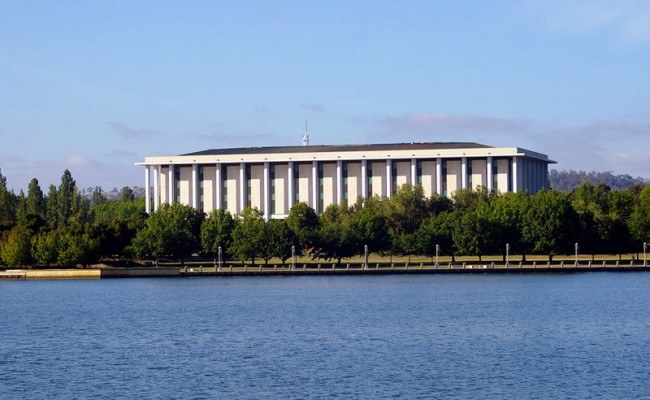Facing each other across Lake Burley Griffin are two government buildings collecting information about the lives of Australians. On one side is the National Library, a concrete and marble edifice inspired by ancient Greek temples and open to the public seven days a week. Facing it are the new ASIO headquarters, the one-way glass exterior symbolising an organisation keen to see everything happening outside, even as it hides everything going on inside.
ASIO has been expanding over the last decade. Hungry for ever more information, ASIO and their friends now have warrantless access to metadata relating to every electronic communication in Australia. Attorney-General George Brandis famously had great difficulty explaining the concept of ‘metadata’ in an interview on Sky News at the time the legislation was announced. Had he wandered down the hill to the National Library prior to his interview, he would have found an entire building full of metadata experts.
Since 2009 the National Library has been using these skills to build an extraordinary service called Trove. Trove brings together over 470 million records: full-text digitised newspapers, bibliographic information from all of Australia’s public libraries, maps, diaries, archives, academic journal articles, theses, music, digitised photographs and artworks, and archived websites. It is the largest freely accessible collection of Australian history and culture ever assembled. Less than seven years old, Trove is already described by the Australian Academy of the Humanities as ‘critical research infrastructure’.
The federal government evidently sees things differently. In February the Canberra Times revealed that the library was poised to sack more than twenty staff and cease aggregating external content in Trove, following a budget cut of $4.4 million. When questioned about the cuts, a government spokeswoman said that the library should ‘look for donors or support from the private sector‘.
Conservative governments around the world are increasingly antagonistic to libraries. In 2013 the Harper government in Canada introduced a new wide-ranging code of conduct for Libraries and Archives Canada employees. The new Code emphasised their ‘duty of loyalty’ to the ‘duly elected government’ and included restrictions on involvement with any activity that might be construed as criticism of Canada’s leadership. Two years later, the British Library turned down a donation of archived material relating to the Afghan Taliban, fearing it could put them in breach of the Terrorism Act (2000). In the UK, hundreds of local public libraries have been closed or forced to run entirely on volunteer staff after savage cuts to local government funding. In the most stunning example, Birmingham’s brand new £189 million central library – the largest regional library in Europe – ceased purchasing new books last August and librarians asked the public to donate their own. Meanwhile, in the United States, the Librarian of Congress, James Billington, spent twenty-eight years delaying all progress in the organisation. President Obama’s nominee to replace Billington, Dr Carla Hayden, will be the first ever Librarian of Congress to use email.
On the face of it, this seems odd. Intended for self-starting citizens keen to improve themselves and think freely, public libraries are one of the great symbols of liberalism and the Enlightenment. But of course no matter how much our modern governments like to paint themselves as defenders of liberalism and freedom, they are far from it. Neoliberal market fetishisation with a dash of authoritarianism is the ideology of our times.
These governments are not interested in information (or anything else for that matter) being free. For them, information is something that should flow inwards, not outwards. It should be controlled, not released. While Brandis was ushering bills through Parliament to allow his intelligence agencies to vacuum up information about every Australian’s electronic communications, he was simultaneously fighting against Freedom of Information requests for documents as innocuous as his meetings diary. The Australian government’s obsession with controlling information is expressed in the form of ‘drops’ to favoured journalists, AFP investigations into unauthorised leaks, and phrases like ‘on water matter’ and ‘commercial in confidence’. New laws make it a criminal offence for doctors and teachers to talk about what they see in immigration detention centres, and perfectly legal for police to monitor the communications of journalists.
The first keynote speaker at the recent 2016 Code4Lib library technology conference was Kate Kraus, Director of Communications and Public Policy at the Tor Project. Kraus told the conference:
The decisions you make about what to collect, what to retain, what to distribute and who can see it are politically charged and they are moral choices.
The National Library’s great sin was to create a service built on the ‘moral choice’ of radical openness. Trove allows the National Library to pool together works from a vast array of institutions and collections into a single platform. Anyone can use Trove. You don’t have to make an appointment, have a special title or sign up for a membership card. Hackers, historians, knitters, professors, primary school students and lawnmower enthusiasts are all equal. Users can create their own lists and tags for items within Trove. Software programmers who want to do interesting things using Trove can apply for and receive an API key immediately by simply agreeing to a license stating that their work will be non-commercial. This approach – free, open, unpredictable and non-commercial – flies in the face of everything our government stands for.
Trove, as former Manager Tim Sherratt has noted, will not be suddenly turned off. But government ‘efficiency dividends’ and instructions to ‘look for support from the private sector’ are a move to reign in the National Library and the extraordinary egalitarian platform it has created. Meanwhile, on the other side of the lake, ASIO’s collection will continue to expand. To protect our freedoms, of course.
—






